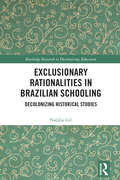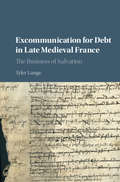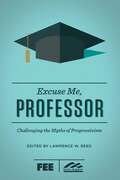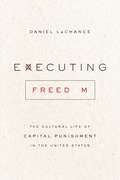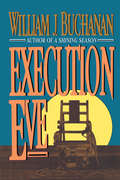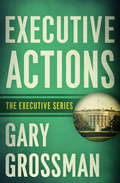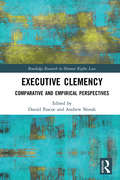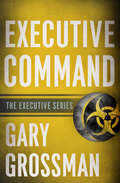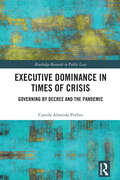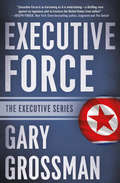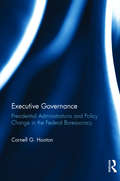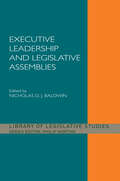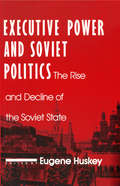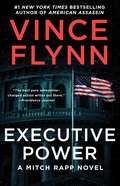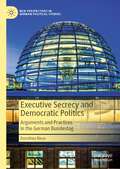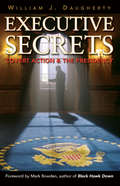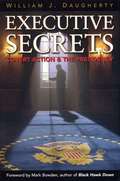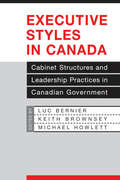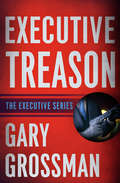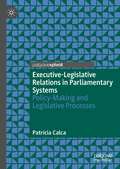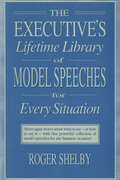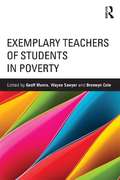- Table View
- List View
Exclusionary Empire: English Liberty Overseas, 1600-1900
by Jack P. GreeneConsisting of an introduction and ten chapters, Exclusionary Empire examines the transfer of English traditions of liberty and the rule of law overseas from 1600 to 1900. Each chapter is written by a noted specialist and focuses on a particular area of the settler empire - Colonial North America, the West Indies, Ireland, the early United States, Canada, Australia, New Zealand, and South Africa - and on one non-settler colony, India. The book examines the ways in which the polities in each of these areas incorporated these traditions, paying particular attention to the extent to which these traditions were confined to the independent white male segments of society and denied to most others. This collection will be invaluable to all those interested in the history of colonialism, European expansion, the development of empire, the role of cultural inheritance in those histories, and the confinement of access to that inheritance to people of European descent.
Exclusionary Rationalities in Brazilian Schooling: Decolonizing Historical Studies (Routledge Research in Decolonizing Education)
by Natália GilThrough in-depth socio-historical analysis of discourses and processes of quantification around school performance and student failure rates in Brazil, this volume highlights the prevalence of Eurocentric colonized thought that results in the persistence of exclusion bottlenecks, different trajectories according to gender, race and class, significant regional variations in the rates of failure and dropout, among other problems. Focussing on processes performed between 1918 and 2012, chapters offer rich analysis of historiographic sources including journals, newspapers, and administrative documentation to trace the development of initiatives intended to promote the democratization of Brazilian schooling. Examination of reforms including school classification, the graduated school model, admissions examinations, and automatic promotion reveal a school system which mirrors wider societal injustices and guarantees academic success for only a minority of students. Bringing a nuanced and elaborated historical perspective of the pragmatics of the selective classificatory logic in different institutional and epistemic qualities of the school organization of children and reasoning about abilities and achievement, it will appeal to scholars and researchers with interests in curriculum and assessment, the sociology of education, and the history of education.
Excommunication for Debt in Late Medieval France: The Business of Salvation
by Tyler LangeLate medieval church courts frequently excommunicated debtors at the request of their creditors. Tyler Lange analyzes over 11,000 excommunications between 1380 and 1530 in order to explore the forms, rhythms, and cultural significance of the practice. Three case studies demonstrate how excommunication for debt facilitated minor transactions in an age of scarce small-denomination coinage and how interest-free loans and sales credits could be viewed as encouraging the relations of charitable exchange that were supposed to exist between members of Christ's body. Lange also demonstrates how from 1500 or so believers gradually turned away from the practice and towards secular courts, at the same time as they retained the moralized, economically irrational conception of indebtedness we have yet to shake. The demand-driven rise and fall of excommunication for debt reveals how believers began to reshape the institutional Church well before Martin Luther posted his theses.
Excuse Me, Professor: Challenging the Myths of Progressivism
by Ron Robinson Lawrence W. ReedThere's little truly "progressive" about Progressivism. True progress happens when humans are free, yet the Progressive agenda substantially diminishes freedom while promising the unachievable. Excuse Me, Professor provides a handy reference for anyone actively engaged in advancing liberty, with essential essays debunking more than 50 Progressive clichés.Does the free market truly ignore the poor? Are humans really destroying the Earth? Is the government truly the first best source to relieve distress?Compiled and edited by Lawrence W. Reed in collaboration with the Foundation for Economic Education and Young America's Foundation, this anthology is an indispensable addition to every freedom lover's arsenal of intellectual ammunition.
Executing Freedom: The Cultural Life of Capital Punishment in the United States
by Daniel LachanceIn the mid-1990s, as public trust in big government was near an all-time low, 80% of Americans told Gallup that they supported the death penalty. Why did people who didn't trust government to regulate the economy or provide daily services nonetheless believe that it should have the power to put its citizens to death? That question is at the heart of Executing Freedom, a powerful, wide-ranging examination of the place of the death penalty in American culture and how it has changed over the years. Drawing on an array of sources, including congressional hearings and campaign speeches, true crime classics like In Cold Blood, and films like Dead Man Walking, Daniel LaChance shows how attitudes toward the death penalty have reflected broader shifts in Americans' thinking about the relationship between the individual and the state. Emerging from the height of 1970s disillusion, the simplicity and moral power of the death penalty became a potent symbol for many Americans of what government could do--and LaChance argues, fascinatingly, that it's the very failure of capital punishment to live up to that mythology that could prove its eventual undoing in the United States.
Execution Eve
by William BuchananIn a story reminiscent of Dead Man Walking, the murder of golf star Marion Miley enraged the nation. People were finally quieted when three men were arrested, tried and convicted. But on the night of their scheduled execution, the warden, "hang'em high" lawman Jesse Buchanan, is unsure of one prisoner's guilt. His actions change his life forever and alter the course of capital punishment in America.
Executive Actions: A Presidential Thriller (The Executive Series #1)
by Gary GrossmanOne bullet puts the plan in motion…&“The best political thriller I have read in a long, long time―right up there with the very best of David Baldacci.&”—Michael Palmer, New York Times-bestselling author of Oath of Office An assassin&’s bullet changes the course of the presidential election—not by killing Democratic candidate Teddy Lodge but by killing his wife. Riding a wave of popular sympathy, Lodge surges forward as the man to beat for incumbent President Morgan Taylor. Meanwhile, Secret Service Agent Scott Roarke is ordered by President Taylor to investigate the assassination, which unravels a deadly Soviet plot that has incubated for decades. But it&’s not just the Russians that Agent Roarke must contend with. Another nation has a sleeper agent—poised to forever alter American policy in the Middle East… &“Grossman had done lots of research on everything from political infighting to clandestine military operations…holds reader interest right up to the inevitable conclusion.&”—Publishers Weekly
Executive Clemency: Comparative and Empirical Perspectives (Routledge Research in Human Rights Law)
by Daniel PascoeNearly every country in the world has a mechanism for executive clemency, which, though residual in most legal systems, serves as a vital due process safeguard and as an outlet for leniency in punishment. While the origins of clemency lie in the historical prerogative powers of once-absolute rulers, modern clemency laws and practices have evolved to be enormously varied. This volume brings comparative and empirical analysis to bear on executive clemency, building a sociological and political context around systematically-collected data on clemency laws, grants, and decision-making. Some jurisdictions have elaborate constitutional and legal structures for pardoning or commuting a sentence while virtually never doing so, while others have little formal process and yet grant clemency frequently. Using examples from Asia, Europe, Latin America, the Caribbean, and the USA, this comparative analysis of the law and the practice of clemency sheds light on a frequently misunderstood executive power. This book builds on existing academic scholarship and expands the limited geographical scope of prior research, which has tended to focus on North America, the UK, and Australia. It relays the latest state of knowledge on the topic and employs case studies, doctrinal legal analysis, historical research, and statements by clemency decision-making authorities, in explaining why clemency varies so considerably across global legal and political systems. In addition, it includes contributions encompassing international law, transitional justice, and innocence and wrongful convictions, as well as on jurisdictions that are historically under-researched. The book will be of value to practitioners, academics, and students interested in the fields of human rights, criminal law, comparative criminal justice, and international relations.
Executive Command (The Executive Series #3)
by Gary GrossmanA Secret Service agent must stop terrorists targeting America&’s most valuable—and vulnerable—natural resource…&“A great thrill ride.&”—Dwight Jon Zimmerman, New York Times-bestselling coauthor of Lincoln&’s Last Days The nation&’s water resources are high on the terrorist target list—but low in America&’s consciousness. Water sources are largely unprotected, providing open access to any enemy with chemicals and biotoxins. So far we&’ve been lucky. But now that luck may be running out… This is the all-too-real-and-present danger facing President Morgan Taylor and Secret Service Agent Scott Roarke as they try to prevent terrorists from destroying America and its infrastructure city by city, state by state. Fact-based in frightening detail, Executive Command is a political thriller that will leave you wondering the next time you pour a glass of water. &“Moving at break-neck speed and nothing short of sensational. Grossman is a master storyteller who sets you up and delivers. Executive Command is not just a great book, it&’s a riveting experience!&”—W.G. Griffiths, award-winning and bestselling author of Methuselah&’s Pillar
Executive Dominance in Times of Crisis: Governing by Decree and the Pandemic (Routledge Research in Public Law)
by Camila Almeida PorfiroIn recent times, there has been a growing dominance of executives centered on the figure of a central leader, while parliaments, which should be the focus of political power, are being marginalized. This development reflects a historical process that has only worsened with the COVID-19 emergency. This book argues that the frequent use of unilateral acts by the executive, exacerbated in times of emergency, can lead to a process of serious democratic erosion. It holds that the unlimited expansion of unilateral action is incompatible with the principle of separation of powers and the basic elements of a constitutional democracy. The judicial and legislative branches, especially in times of crisis, must exercise firm control over executive acts. It puts forward the case that they should limit abuses and risks to democracy based on parameters that are attentive to democratic principles, institutional capacities, and the protection of fundamental rights. In this scenario, the book offers a contemporary analysis of executive dominance in Brazil, Italy, and Germany, particularly in the context of the COVID-19 pandemic. It engages with traditional literature on the subject while providing a novel perspective, particularly in relation to the Global South. The book will be of interest to academics and researchers working in the areas of constitutional law and politics, administrative law, and international and comparative law.
Executive Force (The Executive Series #4)
by Gary Grossman&“Electrifying…A political thriller of the highest order, cut from the cloth of Allen Drury and Richard Condon.&” ―Jon Land, USA Today-bestselling author of The Tenth Circle Local and national political figures are systematically assassinated. A growing secessionist movement stirs up anti-government fervor. The combination creates instability, fear, nationwide unrest—and lack of confidence in leadership. With the clock ticking toward a monumental constitutional crisis, President Morgan Taylor assigns Secret Service Agent Scott Roarke to investigate the assassinations. Meanwhile, Roarke&’s fiancée, an assistant to the U.S. Supreme Court Chief Justice, is tasked with researching the separatists. As attorney Katie Kessler goes rogue to gather evidence for the court, Roarke hunts a lone assassin across two continents. Their paths lead them both to a decades-old plot hatched at a private school in Switzerland—and now leading to North Korea. With the assassin ready to make his greatest kill and critical destabilizing votes occurring state-by-state, the president must decide whether to activate America&’s own secretive, long-incubating active measures against an enemy that can&’t be exposed, but must be stopped. Timely and revealing, with an inside-out view of real and present dangers, Executive Force brings a political reality to the page that feels like breaking news. &“Couldn&’t be more timely…as harrowing as it is entertaining.&”—Joseph Finder, New York Times-bestselling author of House on Fire
Executive Governance: Presidential Administrations and Policy Change in the Federal Bureaucracy
by Cornell G. HootonThis study explores the difficulties of translating presidential policy initiatives into ground-level policy implementation by the permanent government. Drawing on organization theory, it focuses on the ways that bureaucratic behaviours shape an agency's responsiveness to directives.
Executive Leadership and Legislative Assemblies (Library Of Legislative Studies)
by Nicholas D. J. BaldwinThe relationship between a head of government (head of the executive branch) and a nation's parliament or legislative assembly (the legislative branch) has long been the focus for comment and analysis - for example, has the prime minister in the United Kingdom come to a position of dominance at the expense of the power of parliament? Does the American president stand head and shoulders above Congress? Is a French president master of the system? Need the Russian president pay attention to the Duma? What of the position in other parliamentary and presidential systems?In this book, Baldwin seeks to provide answers, and does so by drawing upon the knowledge and expertise of an international group of scholars whose essays advance our knowledge of the subject.This book was previously published as a special issue of the Journal of Legislative Studies.
Executive Politics in Times of Crisis
by Martin Lodge Kai WegrichExecutive Politics in Times of Crisis brings together leading international scholars to consider key trends and challenges that have defined executive politics over the past decade. It showcases key debates in executive politics and contributes to an understanding of the 'executive factor' in political life.
Executive Power and Soviet Politics (Contemporary Soviet - Post-soviet Politics Ser.)
by Eugene HuskeyEver since the behavioral revolution reached Communist studies more than 2 decades ago, Western scholarship has tended to ignore the powerful and unwieldy institutional structure of the Soviet government. Today, suddenly, it is clear that the dramatic political and legislative reforms of the Gorbachev years will remain incomplete as long as the issues of state bureaucratic power and executive prerogative are unresolved. This volume, brings together original studies of the Soviet executive under Gorbachev by specialists including Barbara Chotiner, Stephen Fortescue, Brnda Horrigan, Ellen Jones, Wayne Limberg, T.H. Rigby and Louise Shelley. Among the topics covered are the major economic, national security and law enforcement ministries, the presidency, the cabinet and questions of presidential-ministerial, presidential-presidential, legislative-executive and party-state relations.
Executive Power in Theory and Practice
by Gary L. Mcdowell Terry L. Price Hugh LiebertSince September 11, 2001, long-standing debates over the nature and proper extent of executive power have assumed a fresh urgency. In this book eleven leading scholars of American politics and political theory address the idea of executive power.
Executive Power: Separation Of Power, Executive Power, And Memorial Day (A Mitch Rapp Novel #6)
by Vince FlynnThe New York Times bestselling Mitch Rapp series returns with this &“fast-paced spy thriller&” (People) following the country&’s best assassin as he finds himself in the crossfire of America&’s deadliest enemies. Returning from a covert mission, Mitch Rapp was publicly hailed by the president for his role in the fight against terrorism. After years of working in the shadows, Rapp was caught in the media spotlight—and marked for death by virtually every terrorist in the world. Now a CIA advisor, Rapp is ready to battle terror far from the front lines. When a Navy SEAL team in the Philippines is ambushed, all evidence points to a leak within the US State Department. And a greater threat lurks—a ruthless assassin working for the most powerful men in the Middle East, who are bent on igniting a world war. With the world watching, Rapp must hold back the flames of Armageddon.
Executive Secrecy and Democratic Politics: Arguments and Practices in the German Bundestag (New Perspectives in German Political Studies)
by Dorothee RieseThis book investigates the parliamentary negotiation of executive secrecy. Parliaments depend on information to fulfil their roles as the people’s representatives, legislators and overseers of the executive. However, there are examples of executive secrecy across all policy fields. How, then, do parliamentary actors try to reconcile secrecy and the normative demands of an open, democratic society? This volume analyses parliamentary arguments, conflicts and patterns of agreement around this topic in the case of Germany. Based on two case studies – intelligence agencies secrecy and Public Private Partnership secrecy – it argues that substantive justifications of secrecy focusing on necessity are highly contested. By contrast, procedural legitimation of secrecy, namely deciding about it democratically, is crucial. Still, there are inherent limits to the legitimation of executive secrecy. The book therefore underlines the fragility of secrecy’s legitimation, and its need for constant actualisation.
Executive Secrets: Covert Action & the Presidency
by William J. Daugherty&“Clears up some common misconceptions of the CIA . . . an insider&’s perspective on how covert action really works, or fails&” (Savannah Morning News). Covert action has been used as an instrument of statecraft by America&’s leaders since its earliest days. Some presidents have used it wisely, contributing to our success and security. Others have used it poorly, not understanding its limitations and weaknesses, with disastrous results. Surrounded by secrecy as it is, it&’s not surprising that covert action can provoke confusion, ambivalence, and strong feelings among the citizens of a democracy. Executive Secrets shines a light on the development and execution of foreign policy and the role covert action has played—forging a deeper and more nuanced understanding of both its value and its drawbacks in the ongoing project of keeping the United States safe from its adversaries and respected by its allies. &“A most informative study of covert action. . . . A valuable work that will be treasured by scholars and professionals in the field. Highly recommended.&” —Choice &“Daugherty has done us all a tremendous service by attempting to rescue the Agency from the myths, both well-meaning and malevolent, that shape our understanding of it. . . . This book ought to dispel some of the fog that obscures our understanding of the C.I.A. and that prompts the gigantic mood swings in our attitude toward intelligence gathering and covert actions.&” —Mark Bowden, from the forewordA History Book Club Selection
Executive Secrets: Covert Action and the Presidency
by Mark Bowden William J. DaughertyA frank and refreshing evaluation of several Chief Executives, their Directors of Central Intelligence, and even some lover in the hierarchy, Executive Secrets shines light on the development and execution of foreign policy through the understanding of the tools available, of which covert action may be least known and understood. This book is a great tool for the press, the public, and many political appointees in the National Security System. A History Book Club Selection with a foreword by Mark Bowden, author of Black Hawk Down.
Executive Styles in Canada
by Michael Howlett Luc Bernier Keith BrownseyCanada's political regime is centred on the existence of a federal system of government within the institutions of Westminster parliamentary democracy. This system places a great deal of political power in the hands of cabinet ministers, and while cabinet systems of government in Canada have evolved at different speeds in different federal and provincial governments, they have, over the last two decades, increased centralization of administrative and legislative control in ever fewer hands.This shift has been well demonstrated by scholars such as Donald J. Savoie regarding the federal system, but little examined in the context of provincial governance. Executive Styles in Canada places equal emphasis on both levels, explaining how and in what way cabinet systems have conformed to or diverged from this general pattern. This unique collection is the only systematic, cross-provincial study of its kind, and is certain to be of great benefit to anyone interested in the structure of government in Canada.
Executive Treason: A Political Thriller (The Executive Series #2)
by Gary GrossmanA Secret Service agent confronts Russian spycraft, murder in the White House, and a dangerous talk-radio host in a &“completely mesmerizing&” thriller (Dale Brown, New York Times-bestselling author of Eagle Station). The terrorists who came within a heartbeat of undermining the presidency of the United States in Executive Actions are back in Executive Treason with a new—and deadlier—plot to destabilize the U.S. government. It begins with the mugging and murder of a female White House staffer. Secret Service Agent Scott Roarke discovers the larger truth: the murder was committed by his secret nemesis, the mysterious assassin who had stayed one step ahead of him during the presidential campaign. This time, Roarke has found clues about the assassin&’s past that give him the tools he needs to hunt the hunter—and also silence a popular hate talk radio host dividing the country. But the clues can only go so far. Roarke needs all his skills—and a lot of luck—if he&’s going to catch his quarry… &“Fast-paced, with vivid characters and a plot right off the front pages. Surprises you on every page. A winner.&”—Larry Bond, New York Times-bestselling author of Arctic Gambit
Executive-Legislative Relations in Parliamentary Systems: Policy-Making and Legislative Processes
by Patrícia CalcaAnalysing the conditions under which governments are more likely to present an executive law or a government bill, this book addresses a central aspect of the decision-making process of public policies. Drafting legislation is an important action to achieve specific policy goals, and the path chosen for this process is part of governmental strategy. This book presents a new theoretical explanation of how executives wield legislative power, based in a formal model. The model is tested using new data from Portugal. It shows that in political systems where one of the political actors has veto powers which can easily be overridden, the type of parliamentary majority is the main consideration for the government's choice of legislative instrument. More specifically, when a government does not have the majority in parliament it is more likely to propose an executive law, and contrary, when a government has a majority in parliament, it is more likely to propose a government bill.
Executives Lifetime Library of Model Speeches for Every Situation
by Roger ShelbyThis resource provides over 200 ready-to-use model speeches covering many different business purposes and situations. The library should be broad enough to be used by executives in all types of industry and all size firms.
Exemplary Teachers of Students in Poverty
by Wayne Sawyer Geoff Munns Bronwyn ColeEducation and poverty exist in a highly contested relationship even in the developed world. On the one hand, educational outcomes seem solidly attached to socio-economic status, and on the other, education is often cited as a way out of poverty. Success at de-coupling poverty from educational outcomes varies across the developed world. The issues connecting education and poverty are complex, but the question of the successful engagement of students from poor backgrounds involves a complex mix of public policy on poverty, public policy on education, and teacher action. This book focuses on a number of exemplary teachers who demonstrate a set of common pedagogical qualities, assisting them to work productively with persistent classroom challenges in low SES classrooms. Exemplary Teachers of Students in Poverty shares successful classroom practice from schools serving diverse and disadvantaged communities, and stresses that opportunities in school can influence educational engagement and encourage students to achieve. The text locates itself in international debates about education and poverty, and reports on the Teachers for a Fair Go project - an Australian research project into the work of a number of teachers who were successful at engaging students from poor backgrounds. Included in the book: teaching in low SES communities what exemplary teachers of students in low SES communities do specific pedagogical approaches in literacy, ICT, creativity and culturally responsive practices students’ voices professional qualities of these teachers Exemplary Teachers of Students in Poverty will greatly benefit researchers, teacher educators and trainee teachers, allowing them to gain a much deeper understanding of the issues, constraints and perspectives in teaching contexts across low SES communities.

